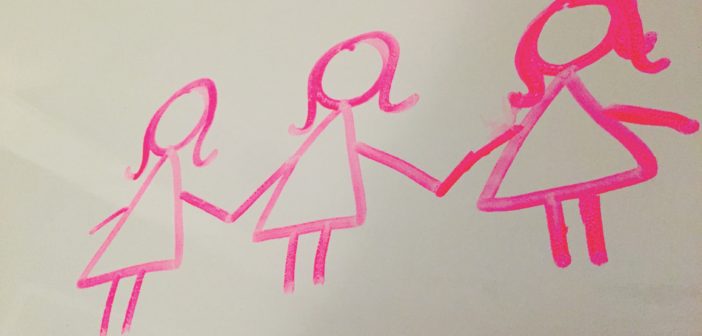Man-haters. Feminazis. Social elitists. These are a couple insults that most people call feminists. In the last few years, feminism has made a resurgence to the forefront of western culture. Celebrities post and discuss feminism across all social platforms, and the entertainment industry is taking a firm stance in line with feminist ideals.
However, as feminism continues to spread through modern societies, its true definition has be come muddled, begging the question: what exactly is feminism?
In recent history, there have been four waves of feminism. The first ignited the women’s suffragist movement in the early 1900s. Ideas of free love encouraged by peaceful protests triggered the second wave in the 1960’s, and rolled into the third wave during the 90s.
The fourth wave has grown in size over the past decade, and since 2014 has crashed upon society’s shores with a vengeance. Constructive dialogue about women’s reproductive rights, birth control, body positivity, and equal pay in the workplace have become daily conversations.
Websites like Rookie Magazine, a site for teenage girls which talks about popular social trends, continuously have articles about gender equality. Alternatively, Tumblr and Twitter have developed into their own soapbox for generating a view into how feminists think and perceive the world.
So, are you…?
The feminists behind this fourth wave face numerous obstacles, one of which being a harshly negative stereotype attached to the word.
North Central College student, Shekia Baker ‘16, says, “The word [feminism]equals a negative connotation,” she explains, “labels add to stereotypes, which is why I don’t like labels.”
Stereotypes for feminists at their extreme include a hatred of men, unshaved underarms and legs, short hair, being loud, and often times, appearing physically displeasing. Identifying as a feminist carries taboos. Feminists are said to exclude men, be lesbians, and generally be unattractive. These horrific rumors and visualizations construct a disconnect between society and the true cause being pursued.
However, these perceptions don’t stop people from placing a flashing dot on themselves.
“Of course I consider myself a feminist. The concept of feminism is incredibly elementary, yet it has been so sensationalized that it has become controversial,” says Megan Howard, a former NCC student. “I generally assume that the belief in equality is so widely accepted, particularly by millennial’s and generation X, that all moral citizens are feminists even if they don’t necessarily subscribe to the feminist label.”
A Washington Post-Kaiser Poll from January 2016 found that sixty-three percent of women between the ages of 18-34, identify as a feminist. The same poll also found that twenty-three percent of men identify as a feminist.
The seventy-seven percent of men who don’t identify as feminist have their own reasons. Steve Henson, ‘16 says, “you don’t have to be a feminist to believe that everyone deserve equality.”
Traditionally, non-identification with feminism I’m plied that you did not feel there is a need for equality among genders/sexes. In recent years, that idea is changing; people may be in support of equality for all, they simply don’t want, or care, to be labeled as feminists. In a sense this mindset could lead to a society where the term “feminist” is irrelevant; if all but a few believe in equality, then only the minority would be labeled, as they differ from the social norm.
Because of the negative stigma that has consistently surrounded the “f-word” though, many individuals shy away from the label and simply will say statements such as, “I believe in equality for all,” or, “why is it called feminism if it’s supposed to be for everyone?”
In interviews for this article, the controversial topic of traditional female standards and their place, never came up. Most people were hesitant to admit they were not a feminist, yet some were embarrassed to say they were a feminist. In a culture growing in acceptance and inclusivity, the way social movements are being depicted by the media is causing a surge of socio-political action and conversation.
Why You Hatin’?
“Feminists are men and women who believe in pursuing equality for women in all facets of life, but instead are most memorably caricatured as belligerent gender-elitists,” says Howard.
Most media outlets place radicalized feminist in front of the camera. They are the most outrageously vibrant and therefore, catch the most attention. Because of this selectivity Howard explain that, “Media portrayal of “feminism” invokes images of unshaven women with pitchforks held at the throats of ‘innocent’ men.”
Labelling someone as a feminist during a newscast can radiate a particular vibe. Radical Feminists, or Rad Fems for short, are extreme in their ideologies; these women believe men should be beneath them, or eradicated, or that women are the elite sex. They do not represent what true feminism is.
The media has been under scrutiny for the past few years. From the recent portrayal of a college man who raped an unconscious women, to race tensions and politics, the public is calling out for unbiased, unstereotypical reporting.
Baker says while she does not agree with Rad Fems, she understands that they may have circumstances which positioned them to come to this point of thought, “I want to understand them and how they think,” said Baker.


1 Comment
Hello,
I am Keigo. I live in Japan and I will study abroad to North Central College next year. Now I am so interested in media. When I check out this school, I knew the publishing for students. Honestly, I was so amazed students published this article. So I would like to join this club when I enter NCC!
And I have a question. Is it possible for me to write about Japanese subculture in this newspaper as “culture”?
I would like to hear your response.
Sincerely
Keigo Watanabe